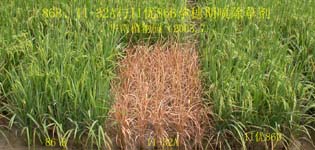
CAS researchers have developed a GM rice that is weedkiller tolerant.
Usually, there are two kinds of herbicides on the market. One targets a few specific types of weeds. The others could kill many kinds of weeds. Unfortunately, they may also destroy crops. Furthermore, they can only be used on certain crops at specific growth stages and can accumulate to harmful levels in the soil, although some of them on the low side. To deal with the problem, researchers are making efforts to develop genetically modified (GM) crops. Recently, breeders at the CAS South China Botanic Garden (SCBG) have succeeded in breeding a GM strain of rice that is weedkiller tolerant.
With trans-genetic technology, the CAS scientists introduced a copy of bar gene to the rice. The gene encodes some kind of enzyme that is inactive to herbicides and can remedy damages. The study has past the pilot studies and a test of the environmental credentials in 2003 and 2004 respectively, which are decreed by the Regulations & Actual Methods for the Trans-gene Engineering Safety on Farming Crops (RAM) enacted by the Ministry of Agriculture. The tests show that the
bar gene has a stable function and full expression of its anti-herbicide prowess in different stages of the rice's growth, without the appearance of gene silencing or flow. Now the tests were approved to make their way into farm-scale tests.
By using this new technology, the seed purity of a hybrid rice can be identified precisely in a short time (about 20 days), according to Prof. DUAN Jun, principal investigator of the project from SCBG. Because of the simplified procedure and shortened period of the seed purity appraisal, the identification cost can be slashed and, at the same time, it can ensure safe production of the two-line hybrid rice while reducing the risk during the hybrid rice seed production to the minimum. Also, the success is applicable to the mechanized process of seed production and weeding by chemical means on cropland, notes Prof. Duan.
China is very active and cautious in the research and popularization of the trans-genetic technology. To develop the related bio-technology, the State allocates a special fund for its development and industrialization throughout the country. Under the aegis of the national authorities, the technology sees an extremely high speed in its development. Viewed from statistics released from 1998 to 2004, the national acreage of the GM crops went up from less than 500,000 hectares to 3.7 million hectares. Yet, its worldwide percentage is still very low, accounting for about 5%. When applying the new technology to farming practice, Chinese government is very prudent and considerate. According to the RAM's documents, all trans-genetic crops must undergo four stages before it is qualified to be put into production on farmlands,
i.e., the experimental research, pilot studies, environmental release and trial production while the related assessment in precision on their safety has to be finished. At present, there are some trans-genetic plants approved by the Ministry of Agriculture and available on the Chinese market, such as cotton, tomato and paprika.





